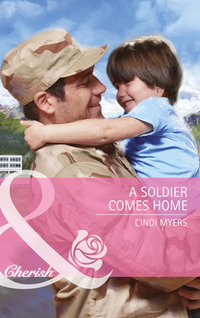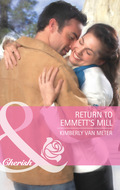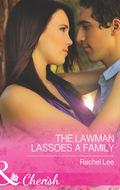Książki nie można pobrać jako pliku, ale można ją czytać w naszej aplikacji lub online na stronie.
Czytaj książkę: «A Soldier Comes Home»
A Soldier Comes Home
Cindi Myers
MILLS & BOON
Before you start reading, why not sign up?
Thank you for downloading this Mills & Boon book. If you want to hear about exclusive discounts, special offers and competitions, sign up to our email newsletter today!
Or simply visit
Mills & Boon emails are completely free to receive and you can unsubscribe at any time via the link in any email we send you.
Table of Contents
Cover
Title Page
About The Author
Dedication
CHAPTER ONE
CHAPTER TWO
CHAPTER THREE
CHAPTER FOUR
CHAPTER FIVE
CHAPTER SIX
CHAPTER SEVEN
CHAPTER EIGHT
CHAPTER NINE
CHAPTER TEN
CHAPTER ELEVEN
CHAPTER TWELVE
CHAPTER THIRTEEN
CHAPTER FOURTEEN
CHAPTER FIFTEEN
CHAPTER SIXTEEN
EPILOGUE
Copyright
Cindi Myers, having discovered at the age of eight that making up stories was more fun than doing homework or chores, worked harder at realising her dream of becoming a professional writer than she ever had at anything else. Fortunately, some dreams do come true, though she is still hoping technology catches up with her fantasies of a self-cleaning house. She lives with her husband and spoiled dogs in the mountains of Colorado.
This book is dedicated to soldiers and their families.
CHAPTER ONE
HOMECOMING OUGHT TO BE as sweet as candied cherries, so the bitter regret that filled Chrissie Evans caught her by surprise. She’d expected to be past those feelings by now, to be able to join in the general jubilation over the return of another group of soldiers to Colorado Springs. She forced a smile to her lips, and a cheerfulness into her voice when she faced Allison O’Reilly, the petite blond receptionist at the dentist’s office she managed.
“What are you doing here?” she asked. “You should be home getting ready to welcome that soldier of yours.” Members of the Sixth Cavalry, who’d been stationed in Iraq for the past year, were coming home today.
“I’ve been ready for days.” Allison grinned, the dimples on either side of her mouth deepening, her blue eyes shining. “The house is as clean as it can get. Once I’d put on my new dress and done my makeup, there was nothing to do but sit. I figured if I came in to work I could at least be with people until it was time to drive to the base.”
“Then sit down and get to work.” Rita Red Horse, the dental hygienist, patted Allison’s shoulder. “You might as well take it easy while you can. That man of yours isn’t likely to let you sleep for at least a week.”
Allison blushed, but sat. “I’m so nervous,” she said. “I can’t wait to see him. And then, part of me is nervous about that, too. A year is a long time. What if he’s different?”
“He’ll be different,” Rita said. “Paul says you can’t go to war and not come back different.” Her husband was a sergeant with the 10th Special Forces, on his second tour in Iraq. “But he’s still your Daniel. The man you love who loves you.”
“Yes,” Allison said, looking reassured. “He is. And he sounds the same in his e-mails, so that’s good.” She shuffled folders on the desk. “Oh God, I’m so nervous!”
Smile fixed in place, Chrissie turned away and walked back into the procedure room. Only when she was alone did she allow the mask to slip, and give in to the sadness that dragged at her. She would have thought by now the grief would not be so sharp, the pain not so fresh. She’d had three years of homecomings to practice hiding her feelings, which made the intensity of her emotions now that much worse. When everyone around her was rejoicing, why was it so hard to pretend she wasn’t missing out?
Trying to shake off the feelings, she began prepping for a crown Dr. Foley would install that afternoon. Keeping busy was the only way to get through this. Tomorrow would be a little better, and the day after, better still.
The door opened and Rita stuck her head into the room. “You okay?” she asked.
Chrissie nodded. “I’m okay.”
“Memories are a bitch sometimes,” Rita said.
Chrissie let out a shaky sigh and nodded. “Not memories, exactly. I mean, Matt never had a chance to come home.”
Rita walked over and patted her shoulder. Paul had served with Chrissie’s husband, Matt, and the two women had shared a bond ever since those early days when the men had shipped out for their first tour of duty together. “You want to go out later?” Rita asked. “Maybe get drunk?”
The invitation surprised a laugh from Chrissie. That had to be a good sign, that she could still laugh. “You don’t drink,” she said.
Rita shrugged. “I can be the driver.”
Chrissie shook her head. “Thanks, but I’m okay. Just a little…melancholy, I guess.”
“If you change your mind, let me know. I promise not to take pictures and use them for blackmail or anything.”
Chrissie laughed again, and waved Rita out of the room. All mirth left with her friend, buffeted by memories of the only homecoming Matt Evans had had. He’d arrived in a flag-draped coffin, accompanied by an honor guard of solemn young soldiers who had avoided meeting her eyes. Twenty-five and married only eleven months—only two of those before Matt had shipped out—Chrissie had worn a black dress that was too big for her to the funeral and mutely accepted the folded flag and the medal, a Purple Heart awarded posthumously. She had been too numb and scared to feel anything.
The numbness had been a way of coping that she could appreciate now. She’d been a widow longer than she’d been a wife, Matt having been killed in the very early days of the war. Some had questioned her decision to stay in the Springs, a military town where she was surrounded by reminders of her loss. But Colorado Springs had been her home for long before she’d met and married Matt. Her parents were here. Her memories were here. The little house on Kirkham Street that she’d bought with Matt’s life insurance money was here. Her job and her friends were here.
So she stayed, and she coped. She made friends with other servicemen’s wives, and a few people like Rita knew her story. But mostly she didn’t volunteer the fact that she was a widow. Doing so forced other women to acknowledge the same could happen to them, and that was too cruel.
On days like today, when a unit returned home or shipped out, or worse, when another funeral was held, she stayed busy and focused on other things. She took long walks, watched movies and read books. She went out with friends. She didn’t read the papers or watch the news.
She dated some, but never another soldier. It was her one firm rule. Why take a chance on falling for someone else who could be killed? Why go through that particular pain again?
HOMECOMING OUGHT TO FILL a soldier with warmth—the warmth of firelight and candles. The warmth of a woman welcoming her man back into her arms.
But all Captain Ray Hughes felt now was cold, as if his chest was filling up with ice. He stood in the Special Events Center at Fort Carson, Colorado, surrounded by men and women embracing, by groups of schoolkids waving signs, by other children squealing with delight and mothers sobbing quietly with joy. He was the calm, cold center around which they all swirled.
Occasionally someone would break from their celebrating long enough to glance at him—a brief look of curiosity or pity. He looked away from them, toward the doorway, then snapped his eyes back when he realized he was looking for her, some small stubborn part of him hoping she’d show up, even though he had her letter in his pocket, telling him she wouldn’t be here. That she’d never be there for him again.
He clamped his jaw shut, hard. There was a bad tooth on the left side. It didn’t usually bother him too much, but biting down hard sent a sharp pain through his head, enough to momentarily distract him from the deeper pain that sliced through his chest as the seconds ticked by.
“Hey, Captain, do you need a ride somewhere?” Corporal Daniel O’Reilly stopped in front of him. His arm was around a young woman with blond curly hair and dimples on either side of her pink-lipsticked mouth. Dan had some of the same lipstick smeared on his cheek. His eyes had the glazed look of a man who had had too many beers, but Ray knew the corporal was drunk on the joy of finally being home after a year in Baghdad.
“No, I’m fine,” Ray said automatically.
“This is my wife, Allison. Allison, this is Captain Hughes.”
“Pleased to meet you, Captain,” Allison said. The dimples deepened when she smiled at him.
“Is someone coming to meet you?” Dan asked. He looked around the room. The other men and their wives and girlfriends and parents and children were starting to filter out of the place now.
“I’ll get a taxi,” Ray said, answering—and not answering—the corporal’s question.
“Let us take you wherever you need to go.” Dan’s wife put a gentle hand on his arm. Her eyes were blue, her lashes heavy with too much mascara that somehow made her look even younger, like a girl playing dress-up.
To say no to her would have been too rude. Instead, he let his shoulders relax a little and nodded. “Okay. Thanks.”
He collected his duffel and followed them out of the Events Center, into air so brittle with cold and dryness he half expected it to crackle with each indrawn breath. The sky looked cut from a single piece of deepest turquoise, not a cloud in sight. A blinding sun reflected off the snow heaped around them in drifts, still pristine white and soft on top.
“The snow, can you believe it?” Dan grinned at him. “Back in the summer, I used to hallucinate about days like this.”
“That’s April in the Rockies for you. We had a big storm yesterday,” his wife said. She fished the keys to their car, a navy-blue Subaru Outback, from her purse and handed them to him. “I was worried it would delay your flight.”
“Nothing was gonna keep me from getting home on time, if I had to fly the plane myself,” he said.
Ray looked away while they kissed again, then climbed into the backseat of the Subaru, moving aside a plastic grocery sack full of fabric to do so.
“I’m sorry about that,” Allison said, leaning back to slide the bag over even farther. “They’re some clothes a coworker gave me.” She smiled at her husband. “The cutest things.”
“Allison is the receptionist at a dentist’s office,” Dan said.
He didn’t know what he was supposed to say to this, so he remained silent. Dan pulled out of the parking lot. “Where to, Captain?” he asked.
Ray gave the address to the house he’d bought last year, in a neighborhood near the base.
“I turn at the light here, right?” Dan asked.
“The next light,” Allison said. “They put this new one in just a couple months ago.”
They’d been warned about this kind of thing in debriefing—that things would be changed from how they remembered them. It wasn’t that different than if they’d been in jail. Normal life had gone on without them. Now they had to catch up.
Ray’s jaw tightened again as they turned onto his street. Without even realizing it, he had scooted forward in the seat. He stared out the windshield, watching for the house. It was a brick ranch. A nice enough place when he’d bought it, but now it had the neglected look of an unoccupied building—the driveway unshoveled, blank windows staring out at them.
Dan pulled the car to the curb. Before he’d cut the engine, Ray grabbed his duffel and slid out of the seat. “Thanks for the ride,” he said. “Have a good night.”
Not waiting for an answer, not wanting to risk questions, he hustled up the walk, back straight, duffel slung over one shoulder. A man without a care in the world.
Only when he heard the car pull away did he relax and let the bag drop to the ground. He found the key where they’d always kept it, in a depression he’d chipped from a loose brick over the door.
His first surprise was that the lights came on when he flicked the switch by the door. At least the electricity was still on. His second surprise was what the lights illuminated.
The room was bare except for a TV tray, a scarred coffee table and a recliner covered in tan corduroy. The carpet still showed the indentations where the leather sofa and entertainment center had sat. Ray stared at those small flattened squares of carpet fiber and swore under his breath. He shouldn’t have been surprised. She’d picked out the sofa herself—white leather. Impractical as hell. At least she’d left the chair.
The loss of the television hurt, but he’d get another one.
He walked through the rest of the house, making note of what was missing and what she hadn’t deemed worthy of taking. The air smelled of stale onions and cooking oil and pine cleanser. The kitchen looked all right. She’d left the coffeemaker, and the little table where they ate breakfast. The bigger table in the dining room was gone.
The dresser was there, but she’d taken the bed. He was glad of that. He wouldn’t have to lie there now and wonder who else she’d shared that mattress with. Her clothes were gone from the closet and the dresser, though a single empty perfume bottle stood in the dust on top, as if she wanted to remind him of her. He lifted it to his nose and inhaled, and had an instant image of a laughing, dark-haired young woman looking over her shoulder at him.
He set the bottle carefully back on the dresser and walked out of the room and down the hall to the last door.
This room was unchanged. The Winnie the Pooh border she’d picked out still ringed the room. The single bed under the window filled most of the space. The rest was shared by a dresser and bookcase and plastic milk crates of toys. A fuzzy purple bear grinned at him from the bed. Looking at it made Ray’s chest hurt. He closed his eyes and tried to remember what his son, Thomas James Hughes, looked like, but he couldn’t.
He’d know soon enough. She’d written that she’d left the boy with his parents in Omaha. He’d spoken to his mother only yesterday and she’d confirmed that T.J. was well, but “a handful. I love him dearly, but your father and I can’t wait for you to come and take him home with you,” his mother had said. “We are just not prepared at our age to raise a little one again. Besides, we’re supposed to leave on a cruise next week.”
As if he was prepared. He hadn’t even seen the boy in over a year. Kids changed a lot at that age.
Ray backed out of the room, then stood in the hallway, rubbing his jaw where his tooth throbbed. If he left tonight, he could be in Omaha by morning. He’d spend the night driving, instead of sitting in this house alone.
He returned to the bedroom and retrieved a spare set of keys from their hiding place beneath his socks and headed for the attached garage. The familiar smells of motor oil and old tires greeted him as he stepped into the dimly lit sanctuary. He reached behind him to flip on the light and stared at…
Nothing.
His single curse was loud, echoing off the empty concrete. He closed his eyes, then opened them again, not believing what he was seeing.
The bitch had taken his truck. The brand-new, cherryred Nissan Titan, purchased not eighteen months ago. He’d put the title in her name, thinking he was being smart, in case anything happened to him, and she’d promised to take care of it, to drive it once a week to keep the engine lubricated, even though she said she preferred her little Honda.
She must have sold the Honda. Or maybe sold the truck.
Feeling sick to his stomach and unable to look anymore, he went back into the house, slamming the door behind him.
The refrigerator was empty, but he looked anyway, hoping for a beer. He needed a drink to dull the waves of anger and pain that kept on coming and wouldn’t stop. But he’d have to call a taxi and head into town to find a bar or a liquor store and he wasn’t up to that much interaction with other people yet.
So he sat in the recliner, and stared at the spot where the TV had been. He cursed himself for being an idiot, and cursed the day he’d met the woman who had done this to him, and then cursed the woman herself. Tammy. The mother of his child. The thief who had stolen his truck. The wife who had left him.
CHRISSIE ENDED UP going out after work with Rita—not to drink, but to dinner and a movie. They chose a comedy without a lot of plot, but enough laughs to take their minds off their troubles. She arrived home late and was surprised to see lights burning in the house next door.
The house had been empty for over a month now, ever since Tammy Hughes had moved across town. Though Tammy had never come out and said so, Chrissie suspected her young neighbor had moved in with the skinny private who had been a frequent visitor to the little brick house in the months preceding Tammy’s departure.
Chrissie collected her mail from the box at the end of the drive, then unlocked her front door and went inside, stopping to kick off her shoes in the entryway. Her cats, Rudy and Sapphire, greeted her with pitiful yowls, tails twitching.
“Yes, I know, you’re so mistreated,” Chrissie said, bending to pet them, her mind still on the house next door. She hadn’t thought of Tammy in a while. After Tammy’s husband had shipped out to Iraq, Chrissie had tried to befriend the young woman, who had seemed so lost and alone. Despite the fact that she had a child—a little boy called T.J.—Tammy had seemed like a child herself. She thought nothing of wearing her pajamas and eating only cereal and ice cream for days at a time, letting T.J. do the same. When her Honda broke down, rather than have it fixed, she left it sitting at the curb and began driving the red truck her husband had left behind. When the city had finally towed the car—after leaving numerous citations, which Tammy ignored—she had been unconcerned. “I was tired of it anyway,” she’d said.
Chrissie had gone out with Tammy a few times, giving in to the younger woman’s argument that they deserved to have a little fun. They had spent one memorable evening at a bar frequented by soldiers from nearby Fort Carson. While Chrissie politely fended off the overtures of earnest young men who reminded her of Matt, Tammy drank and danced and flirted and drank some more. Chrissie had ended up pouring her into a taxi and taking her home, and got stuck with the bill for both the taxi and the babysitter.
Soon after that, the private showed up. Tammy would call Chrissie sometimes and ask her to babysit. “I have a class at the community college and my regular girl canceled,” she’d pleaded.
Chrissie suspected the only thing Tammy was studying was the private, but she’d agreed to babysit, if only for the chance to spend an evening with T.J.
The dark-haired toddler with the chocolate-brown eyes could melt Chrissie with a single gap-toothed smile. A happy child who loved to cuddle, T.J. had won Chrissie’s heart the first time they’d met, when he’d taken her hand and earnestly introduced her to a purple stuffed bear. “This is Mr. Pringles,” he’d said. “My daddy gave him to me.”
Chrissie had never met T.J.’s father. Captain Hughes. Tammy never talked about him, except once, when Chrissie had tried to broach the subject of Tammy’s frequent nights out on the town. “I’m too lonely at the house all by myself,” she said, flipping her long brown hair over her shoulder, her mouth shaped into a pretty pout. “If my husband expects me to sit there all by myself until he comes home, he’s crazy.”
You won’t know lonely until they tell you your husband is never coming home again, Chrissie thought, but she said nothing. After that, she stopped trying to give advice to Tammy. But she would babysit whenever she was asked, and spend hours rocking with T.J., reading to him and singing him songs. In those few hours, at least, she was able to fill the hole inside her where a husband and child belonged.
She carried the mail into the kitchen, the cats following, weaving figure eights around her feet. She put the kettle on for a pot of tea, and opened a can of seafood delight for the kitties. From her kitchen window she could see the kitchen in Tammy’s house. The light was on, but the room was empty. Had Tammy split with her private and decided to come home?
Or had Captain Hughes returned to his empty house?
Her throat tightened at the thought. Had Tammy’s husband been part of the unit that had arrived home today? How must it have been for him, standing in the crowd of joyous families, with no one to welcome him home?
The thought of that man—any man—sitting alone in that empty house after a year away brought tears to her eyes. She blinked them back and did the only thing she could think of to do. She took a bottle of wine from the rack on the counter, and assembled a plate of sandwich fixings from the refrigerator. Then she put on her coat and started next door.
She made it as far as her front porch before she turned around and went back into the house, to comb her hair and touch up her makeup. Not because she wanted to impress him, but because a man who had been away fighting deserved to look at a woman who had gone to a little trouble for his sake.
She hurried across the strip of snow-covered grass between the two houses, cold wind nipping at her ankles and tugging at her coat. She stepped carefully up the icy walk, juggling the wine bottle and the plate of food, and knocked on the front door.
She waited, the cold burning her cheeks, then knocked again, harder this time. In a few seconds, she heard heavy footsteps and the sound of a lock being turned. Then the porch light came on, and the door opened.
Her first impression of him was of strength and height—muscles straining the shoulders of his dress uniform, his head bent to look at her. He had dark hair cut close at the sides, and dark eyes that fixed on her. “Yes?” he asked, his voice gruff.
She cleared her throat, trying to find her voice. “I—I saw the light and…and wanted to welcome you home.” The words sounded stilted to her ears. Would he think she was merely nosy?
He continued to stare at her, looking her up and down as if she were an escaped lunatic. Or a ghost. She could feel his gaze on her, burning her.
She held up the bottle of wine. “I thought you might like something to eat, or drink.”
He stepped back and opened the door wider. “Come in.”
She hesitated, then decided she’d look even more foolish standing on the porch in the cold. She stepped over the threshold and he shut the door behind her. “Let me take those,” he said, relieving her of her burdens.
“I’m Christine Evans,” she said. “I live next door.” She followed him into the kitchen and watched as he found two glasses and a corkscrew.
“Ray Hughes,” he said.
“It’s good to meet you.” She’d seen a picture of him once before, one Tammy had carried in her wallet. The picture had not done him justice. It hadn’t given a true idea of the way he filled a room with his presence.
He handed her a glass of wine. “Why don’t you take off your coat,” he said.
“It’s a little chilly in here.” The house was like ice.
“Sorry. I hadn’t noticed.” He walked into the other room. She followed and saw him turn up the thermostat. The heat kicked on, with the burnt-dust smell of a furnace that hadn’t been used in weeks.
There was no furniture in the room except a coffee table and a recliner. Chrissie stared at the chair, frowning. Tammy must have taken the other furniture when she left. Why? Hadn’t she realized how cruel she was being?
But no, Tammy was not one to think of the impact of her actions.
Ray sipped the wine and studied her. “How long have you lived next door?” he asked.
“Three years,” she said. Since six months after Matt had died.
“Then you must have known my wife.”
“Yes, I knew Tammy.” She sipped the wine and avoided looking at him. Yet she couldn’t keep her gaze averted long. There was something so compelling about his face, something that drew her to study the firm line of his jaw and the jut of his nose.
At the mention of Tammy’s name, his face took on a closed-off look. “Did you say your name was Christine? So people call you Chrissie?”
“Some people.” She hugged one arm across her chest. Tammy had called her that.
“You were Tammy’s friend,” he said.
She nodded. She had tried to be Tammy’s friend, but her brand of friendship was not what the young woman had wanted.
He drained the wineglass, then rolled the stem back and forth in his fingers. “She wrote me about you.”
“She did?” The words—and the chill in his voice—startled her. “What did she say?”
“She said the two of you went out together. That you were single and a lot of fun.” His voice was clipped, louder than it had been.
“We went out a couple of times.” Despite the heater, the air in the house was colder than ever. Chrissie forced herself to stand still, to not act afraid.
Ray glared at her, a white line of muscle standing out along his jaw. “Instead of staying home with our son the way she should have, she was out running around with you. You probably introduced her to the guy she ran off with.”
“No. I had nothing to do with that.” She shook her head.
He hurled the glass against the wall. It shattered. She jumped, her heart racing, and set her own glass on the counter. Her hands were shaking so badly, she had to clench them into fists to keep them still.
“Get out,” he said. “I don’t need you screwing up my life any more than you already have.”
She opened her mouth to argue, to explain she had nothing to do with Tammy’s defection. But one look in his eyes told her he was in no mood to listen. She pulled her coat more tightly around her and walked past him to the door.
Once outside, she broke into a run. Only when she was safely in her own house, the door locked and bolted behind her, did she realize tears were streaming down her cheeks.
She walked to the sink and filled a glass with water, then took a long drink, waiting for her pounding heart to slow. She tried to tell herself Ray’s outburst didn’t mean anything. Of course he was upset; he needed someone to blame and she was handy.
But his words still stung. She’d wanted this man, more than any she’d met in a long time, to like her. She’d felt the pull of attraction to him the moment he opened the door and stood, towering over her yet still vulnerable. The feeling had scared her, but she’d been determined not to run from it. Not this time. After three years, she was ready to move past the hurt. To allow herself to fall in love again. The idea was as thrilling as it was frightening.
And for a few minutes there, she’d held out hope that Ray Hughes would be the one. The man who would help her move past the fear and hurt into something wonderful.
A man who hated her now, before he even knew her. On the scale of things, most would say it was a minor loss, but it hurt all the same. She looked out the kitchen window, toward his now darkened house. Was he sitting there in the dark, brooding? Did he regret anything he’d said?
Was there any way for the two of them to reach across the misconceptions and try again?
Darmowy fragment się skończył.









